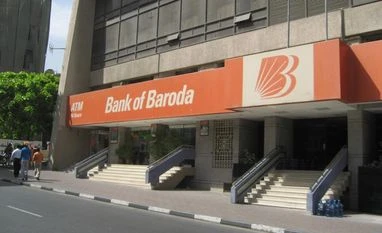By Nidhi Verma
NEW DELHI (Reuters) - India's Bank of Baroda has stopped clearing payments for Russian oil sold above the price cap set by the West from this month, three sources with direct knowledge of the matter said, a move that could expedite transition to a rupee trade mechanism.
Some Indian refiners were paying in the United Arab Emirates dirham currency for Russian low-sulphur crude priced above the $60 a barrel cap using Bank of Baroda, mainly to Dubai-based traders, sources said.
The Group of Seven economies, the European Union and Australia, set the price cap late last year to bar Western services and shipping from trading Russian oil unless sold at an enforced low price to deprive Moscow of funds for its Ukraine war.
"Bank of Baroda is extremely cautious in settling payments for Russian oil bought (at levels) above the price cap," one of the sources said.
"They have told us no for settling payments for above-cap barrels," the person said.
More From This Section
The state-run lender told refiners last month that it would not settle payment from Russian barrels bought above the price cap, the three sources said.
Bank of Baroda did not respond to requests for comment from Reuters.
Before the Ukraine war, Indian refiners rarely bought oil from Russia due to higher freight costs. After Western sanctions on Moscow for its invasion of Ukraine, Indian refiners have been gorging on discounted Russian oil.
Russia has replaced Iraq as the top oil supplier to India in the last few months, data from trade sources showed.
Sources anticipate that prices of Russian sweet crude such as Sokol and ESPO Blend, which was sold near $60 a barrel in recent weeks, could breach the price cap due to a sharp spike in global oil prices triggered by Sunday's OPEC+ decision to cut output.
Some refiners, mainly private operators, have been clearing payments in dirhams for Russian crude through private lender Axis Bank, sources told Reuters last month. It was not clear if Axis Bank had also stopped settling trades for Russian oil sold above the price cap.
Axis Bank did not immediately respond to Reuters' request for comment.
Although Indian refiners buy Russian oil on a delivered basis, copies of invoices reviewed by Reuters also show shipping charges, which helps in calculating the price of crude at Russian ports.
Sources said that problems in settling trade for Russian oil could push sellers to accept rupee payments, at least for barrels that exceed the price cap.
"We have neither stopped nor reduced purchases of Russian oil after Bank of Baroda's decision ... we will consider using rupees to pay for oil purchased above the price cap," another source said.
India does not recognise the Western price cap on Russian oil, a senior oil ministry source said last month.
SETTLEMENT MECHANISM
India set up a mechanism to settle its international trade in rupees last year. Some Russian banks later opened vostro accounts with banks in India to facilitate rupee trade.
The mechanism has not yet started given the lack of Russian appetite for rupees and India's trade deficit with Moscow.
However, during a visit last week to India, Igor Sechin, chief executive of Russian oil major Rosneft, discussed ways to expand cooperation with India across the hydrocarbons value chain, including the possibility of making payments in national currencies.
A switch to rupee payments would help wean Russia from dollars and would save foreign exchange for India.
(Reporting by Nidhi Verma; Additional reporting by Siddhi Nayak in Mumbai; Editing by Tony Munroe and Jacqueline Wong)
)